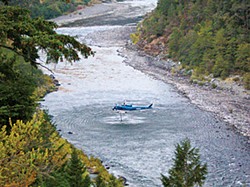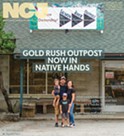Burning Down the Valley
Talking arson with the guy who has to mop up Hoopa's insane number of intentional fires
By Heidi Walters[
{
"name": "Top Stories Video Pair",
"insertPoint": "7",
"component": "17087298",
"parentWrapperClass": "fdn-ads-inline-content-block",
"requiredCountToDisplay": "1"
}
]
About 2 p.m. last Wednesday, a flame leaped up in the grass alongside Hopkins Road on the northern edge of the Hoopa Valley Indian Reservation. In the days following, the fire burned through the steep Hopkins Creek Drainage, seven miles northeast of downtown Hoopa, and spread beyond the reservation onto the Six Rivers National Forest, consuming old growth timber and plantation trees. By Tuesday morning nearly 3,000 acres had burned, half on the reservation and half on Six Rivers, but rain had begun to fall and help douse it.
Smoke from the fire -- dubbed the Mill Creek #4 -- swept over the mountains to hover on the coast, and crept into mountain towns like Orleans. Almost as insidiously spread the rumors: One grower had burned another person's garden. Or they burned their own grow to spite the oncoming CAMP (Campaign Against Marijuana Planting) forces. Or they'd set a fire to make a lot of smoke so CAMP choppers couldn't make their snooping flyovers. One particular rumor that gained traction: It was a Mexican cartel.
Carl Smith, a division chief with the Hoopa Tribe Fire Department, said there's no evidence of a pot grow near where the current fire started. But he won't rule out a pot connection -- there was, in fact, a pot bust just last month up in Supply Creek, across the Trinity River from Hopkins Creek.
But who did it is really beside the point, Smith said. The fact that everybody's pretty sure that somebody did it is the point.
According to a recent study, the Hoopa reservation ranks third among the nation's reservations for arson fires. That presumably considers wildland fires and house fires.
Smith's department strictly deals with wildfires. He said that of the average 194.1 wildfires on the Hoopa reservation, on average, per year, 90 percent are arson. The majority start right by a road, he said, and with most of them -- including the Mill Creek #4 -- natural causes such as lightning, and accidental blazes such as runaway campfires, are easily ruled out. Mostly they find evidence of a "hot start" -- a fire deliberately started by a lighter or matches or some other device.
"But we never find the devices," he said. "And whoever did it, their footprints are usually blown away."
That leaves the investigation up to pulling information from potential witnesses or informants.
And there's the rub, said Smith. For one, there aren't enough investigators to pursue each fire -- the charge of investigating fires in Hoopa falls to the resources-strapped Humboldt County Sheriff's Office, which can't get to every fire. For another, mum's the word's in Hoopa.
"We have arson fires in Willow Creek and the cops jump on it, the neighbors tell on the guy and he goes to jail," Smith said. "And you realize you can't be settin' a fire in Willow Creek. And that's how it is in most of the nation. But here in Hoopa, when you question the neighbors or somebody you think might be a witness, they have a lot of reasons not to tell on the people. They're friends, or they're related, or this guys is a mean person and he might come over and burn my house down. It's what the Humboldt County Sheriff calls a conspiracy of silence."
Actually, there's plenty of talking -- just not to officials. Smith, 67, grew up in the Hoopa Valley and worked 27 years for the Six Rivers National Forest before going to work at the Hoopa Fire Department. So he's heard it all when it comes to Hoopa's arson problem.
"When somebody asks me, who sets the fires? I always tell ’em the same story," Smith said. "And this is something that actually happened to me. One day, I was down here working at the fire department, and this Hoopa tribal member walks up to me, this guy I've known for years, and he says, ‘Carl, I know who's setting all these fires.' And I say, ‘Who's that?' And he says, ‘It's white guys from Willow Creek. They come in here, cruisin' and boozin', and they know they won't get caught in Hoopa like they get caught at home, so they go light a fire here and nothing ever happens to them.' I say, ‘Oh yeah.' The same day, in the afternoon, this Yurok Indian guy that I've known forever, I run into him and he says, ‘Hey Carl, those Hoopas still trying to burn the reservation down?' I just smile and say something pleasant. And then, I go home at night and I'm at the gas station in Willow Creek, and this white guy from Willow Creek that I've known forever says to me, ‘Carl, I know who does most of those fires there at Hoopa.' He says, ‘It's the Yurok guys. They come up, you know, and they're traveling through, and they're jealous because their reservation isn't as big, or one reason or another, and they especially start fires in the gorge on the way home.'
"OK, now. So, what the punch line is, every one of those stories is true. And every other reason you can come up with: the nighttime excitement -- you know, ‘I haven't got a job and I've got a beer or a joint and I'm cruisin' and boozin' in Hoopa and, hey, let's light a fire and watch the engines come in.' Or, I don't know, maybe somebody didn't like the way the tribal election returns came in. Or some guy's mad at his wife. We had a fire awhile back, a woman threw a guy out of his house, and all of his clothes were there in the front yard and a little farther along was this little fire he'd set just to show his disgust. There are a thousand reasons why people set fires, but the most pervading one is, you can set fire for free in Hoopa because there's no punishment."
more from the author
-
From the Journal Archives: When the Waters Rose in 1964
- Dec 26, 2019
-
Bigfoot Gets Real
- Feb 20, 2015
-
Lincoln's Hearse
- Feb 19, 2015
- More »
Latest in News
Readers also liked…
-
Through Mark Larson's Lens
A local photographer's favorite images of 2022 in Humboldt
- Jan 5, 2023
-
'To Celebrate Our Sovereignty'
Yurok Tribe to host gathering honoring 'ultimate river warrior' on the anniversary of the U.S. Supreme Court ruling that changed everything
- Jun 8, 2023
































